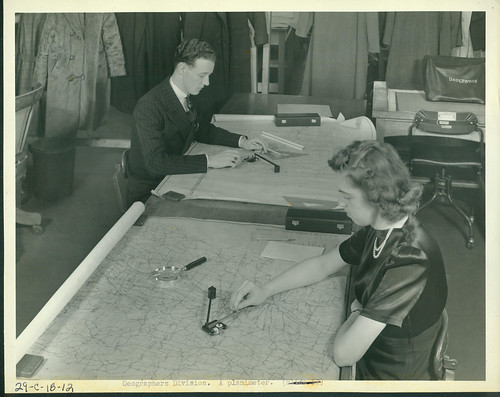This is a site that sounds dull but turns out to be fascinating...The National Institute of Standards and Technology (yawn, right?) is digitizing its archives -- publications and photographs. And the photo collections include their collection of aeronautical instruments and testing procedures, appliance efficiency testing projects, a collection of atomic clocks, automobile testing, and photos of the 1939 project to figure out how to preserve the original copies of the Declaration of Independence and US Constitution. I didn't have the nerve to view the collection of dental research photos. There are pictures of crystals and glass plate photography and space beads and, well, they're up to more than 150 photo collections.
In short -- if you have scientists or engineers (or dentists) in your family, you might well find a photo of them, or of tools and instruments they might have used, in this collection. And, as the Legal Genealogist is always reminding us, photo collections produced by US government agencies are generally copyright free!
Herbert J. Reed of the Electrochemistry Section measuring specific gravity on a battery
I'm a genealogist, and the volunteer librarian at a private local and family history library. I natter about my research, largely neglected, and my library, which is undergoing some big changes trying to survive in a world of Ancestry.com and Google.
Showing posts with label Websites. Show all posts
Showing posts with label Websites. Show all posts
Saturday, August 30, 2014
Sunday, March 11, 2012
The Tragedy of the 1890 Census
I just discovered that the Society of American Archivists has made back issues of their journal available for free online. Big whoop you say? While many of the articles are not terribly interesting for a genealogist, many are fascinating. For example, take this article on The Creation and Destruction of the 1890 Federal Census, by Robert Dorman. It provides an illuminating look into the political and social issues that shaped the way the 1890 census was conducted, stored, and lost. Did you know that at one point, a congressman suggested that ALL the censuses, back to 1790, were "antiquated" pieces of paper not worth the cost of storage?
I didn't know that, when the creation of a national archives was being discussed in the 1930's, there had been dozens of fires and floods that damaged records. The one causing the most public outrage, apparently, was a 1911 fire at the New York State Library -- I haven't done any New York Research, but this sounds like it was a real tragedy, destroying much of the records of the Dutch Colonial period.
Scary reading, indeed.
I didn't know that, when the creation of a national archives was being discussed in the 1930's, there had been dozens of fires and floods that damaged records. The one causing the most public outrage, apparently, was a 1911 fire at the New York State Library -- I haven't done any New York Research, but this sounds like it was a real tragedy, destroying much of the records of the Dutch Colonial period.
Scary reading, indeed.
Friday, March 2, 2012
1940 Census Pictures
Do you subscribe to the National Archives' flickr.com account RSS feed? Yesterday they posted pictures from their collections of 1940 census staff, including enumerators and analysts.

Past uploads have included pictures of notable scientists (including a slew of women) and old pictures of Washington, DC.

Past uploads have included pictures of notable scientists (including a slew of women) and old pictures of Washington, DC.
Monday, January 2, 2012
Resource for Texas History
The good news: my cousin has published an article in Southwestern Historical Quarterly, which is very cool for a newly-minted history PhD. The bad news: it's behind a subscription wall and I can't read it.
However, while trying to find it, I learned a lot about the Texas State Historical Society website, which has some nice digital resources. For example, the first 100 years of the Quarterly have been digitized and are available at http://www.tshaonline.org/shqonline/digital-content
They've also created a Handbook of Texas, and a Handbook of Civil War Texas, both searchable. There's even a Texas Almanac, which has a database of place names, profiles and obituaries of notable Texans, and other almanac-y tidbits.
However, while trying to find it, I learned a lot about the Texas State Historical Society website, which has some nice digital resources. For example, the first 100 years of the Quarterly have been digitized and are available at http://www.tshaonline.org/shqonline/digital-content
They've also created a Handbook of Texas, and a Handbook of Civil War Texas, both searchable. There's even a Texas Almanac, which has a database of place names, profiles and obituaries of notable Texans, and other almanac-y tidbits.
Subscribe to:
Posts (Atom)